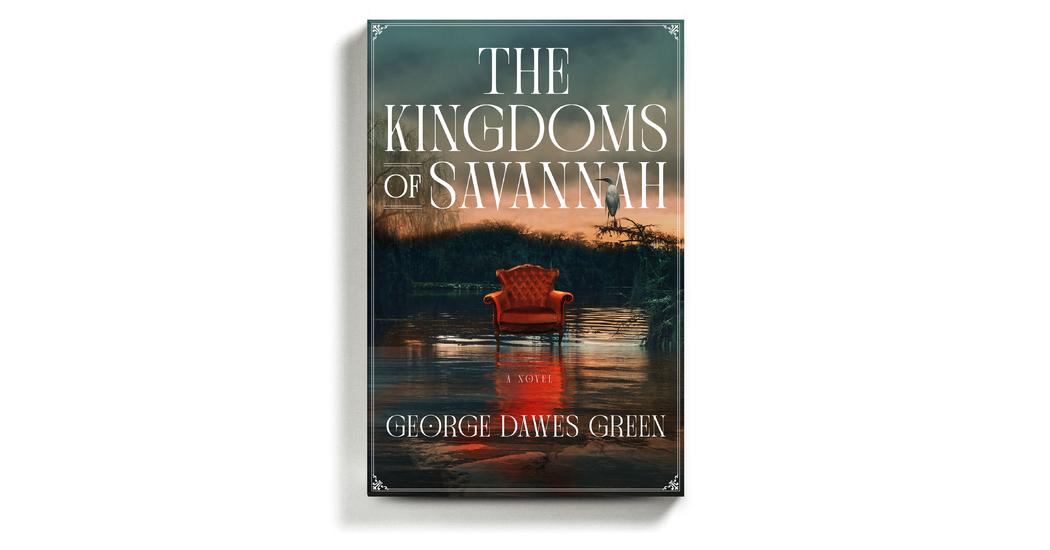
THE KINGDOMS OF SAVANNAH
By George Dawes Green
289 pages. Celadon Books. $27.99.
Writer’s block has gone lamentably out of fashion, with people posting on the internet for free at all hours, the James Patterson conveyor belt, etc. So an author who takes a nice long time between books can provoke special affection and attention.
George Dawes Green is one of those authors, a periodic comet. His last novel, “Ravens,” came out early in Barack Obama’s first term. He’s better known for “The Juror,” published in 1995, when Bill Clinton was president and John Grisham was king of the best seller charts, and made into a movie starring Demi Moore and Alec Baldwin.
Green may not be blocked, but just busy as founder of The Moth, the storytelling nonprofit that was spreading its wings when podcasts were still in the chrysalis. Certainly his new novel, “The Kingdoms of Savannah,” doesn’t read as sweaty or overworked: It’s layered, but like a parfait goes down sweet, chilled and easy. Saturated in regional detail and studded with oddballs, it has the flavor of Southern Gothic without the bitter aftertaste.
The second chapter — there are only five — is called “Flannery Knew. Flannery Got Out, What a Lucky Girl!” after one of the drunken proclamations of the book’s most entertaining figure, a widowed matriarch named Morgana Musgrove. She’s in a book club named for Flannery O’Connor, though its members generally dislike O’Connor’s work, thinking her characters “grotesque” and “miserable.” “Welcome to life, ladies,” the more cultivated Morgana despairingly tells them.
Morgana is difficult, even cruel. When one of her four adult children, Ransom, was 13, she told him that he was “destined to be a vagabond.” But like those doyennes of yore, she is kind of fabulous. She drives a 1989 burgundy Caprice, hates air-conditioning, was admired by the singer Johnny Mercer in his day, wears Iris Poudre perfume (not cheap!), has luxurious towels and a lush garden, and maintains a so-called Turkish room, “for intimate conversations, you know?” The kids were “never allowed in there,” Ransom’s sister Bebe remembers of this special room, its walls stenciled with Aladdin lamps, “unless something big was going down.”
Something very big is going down here (or “heah”) in Savannah, a city Green renders in a kind of knowing detail maybe not seen since “Midnight in the Garden of Good and Evil,” by John Berendt. A full range of dialects are enacted, Black and white: the “old, pure, nonrhotic Savannah accent: rich and haughty, with a flavor of doom.” There’s a whiff of Tom Wolfe in some of the more freewheeling passages (“buh-blink, buh-blink, buh-blink”). Likewise in Green’s staging of urban class and racial conflict. He takes readers from the Romanesque revival mansion that Morgana showily occupies and the soirees she hosts to malls and rotting fairgrounds (“these are the fairgrounds Flannery wrote about!”) to the “ghost tours” that clog the streets to the waterlogged tunnels under them to homeless encampments below the Harry S. Truman Parkway exit ramp: “regularly destroyed by the police,” Green writes in a series of historical endnotes, “yet always back they come.”
On its surface this is a mystery about who murdered a young bipolar man, Luke Kitchens, last seen alive in the company of a middle-aged archaeologist named Matilda Stone — “Stony” for short. Morgana, whose multiple inherited businesses include a fallow detective agency, has been enticed by an enormous fee to help investigate. But the deeper mystery is: What is the paradisiacal-seeming “Kingdom” to which Stony, who’s been kidnapped, keeps venturing in her mind? Is it real? Is it recoverable?
Green wants to hammer home that undergirding Savannah’s beauty — all the flowers and fashion and conviviality — is unspeakable ugliness that must be given voice. To help accomplish this, Morgana conveniently has a Black granddaughter, Jaq, a documentarian who’s making a movie called “Some Town Out of a Fable.” Jaq visits the Georgia Historical Society, where “three small old rodenty white women” are researching their dynasties, and is told by a worker: “Every book in here. They’re all just the sickest crime stories you can imagine.”
If history is made up of crime stories, the author seems to be proposing, then why not a crime story to help rethink history?
“The Kingdoms of Savannah” is an ensemble piece with no real center of gravity, and way too many kooky humans to enumerate here: a slumlord, a lazy boatman, a whistling vagrant. This time around, Quentin Tarantino should be enlisted to direct, maybe doing to slave owners what Brad Pitt’s character did to the Nazis in “Inglourious Basterds.”
Truth be told, I couldn’t always follow it, but I dug it. Green shows how you can love a place’s stink, find it splendid even as you despise its sediment.



